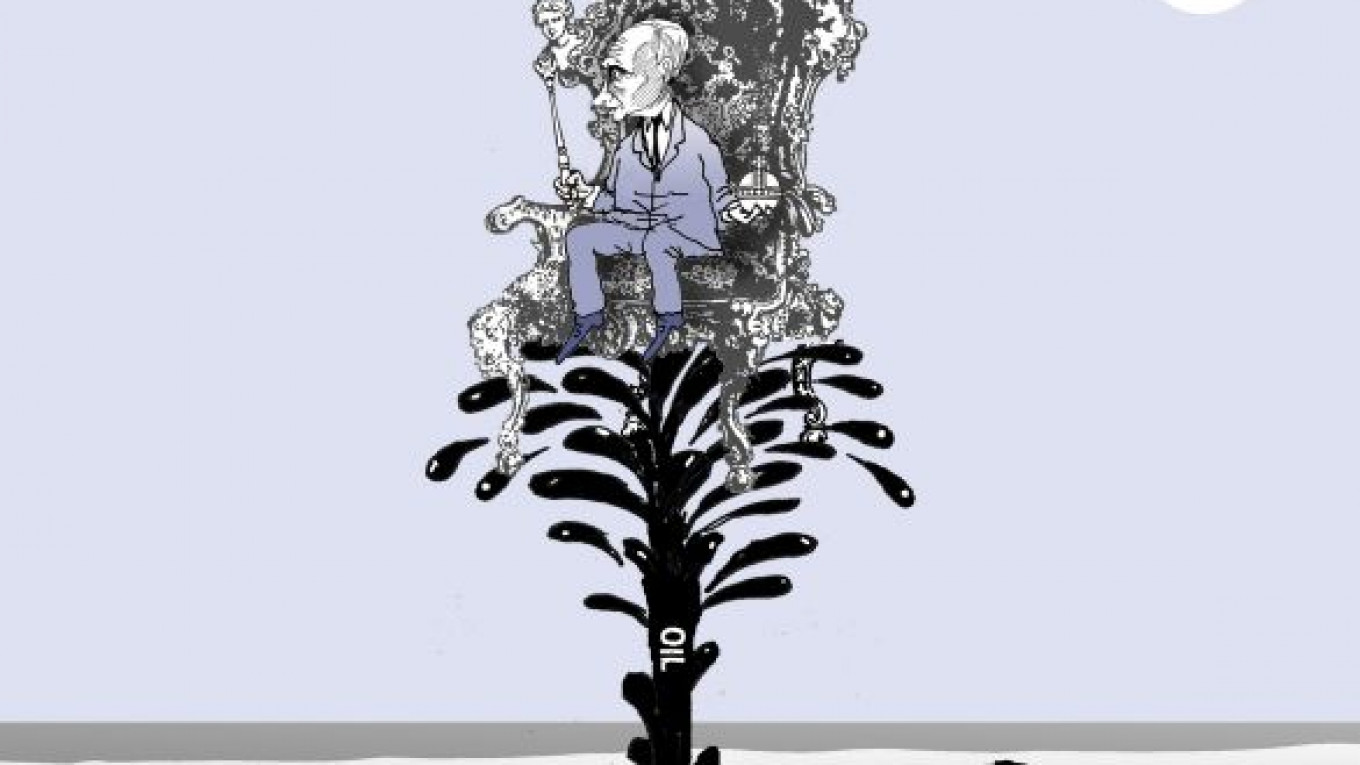At first glance, the outlook looks good for Russia's democracy in a new study by Charles Robertson, global chief economist at Renaissance Capital.
The report, which analyzes the relationship between democracy and per capita gross domestic product, classifies Russia as a "weak democracy" and concludes that it is "highly likely to become a strong democracy in the next few years." Relying on historical trends in 150 countries over the past 60 years, the report argues that similarly "weak democracies" at similar per capita GDP levels have a high probability of turning into much stronger democracies.
But three factors could curb the report's optimism regarding Russia's democratic future. As the Kremlin and Foreign Ministry like to remind the West, Russia doesn't fit into conventional notions of democratic development — or economic development for that matter.
Second, the main beneficiaries of Russia's GDP growth are government bureaucrats and their corrupt clienteles, not the middle class in the private sector, which remains small and weak. This is one reason why it is in no position to demand political reforms.
Third, the report's optimistic scenario is largely based on the old "theory of modernization" that U.S. economist Seymour Lipset popularized in the 1960s. According to the theory, economic growth in a given country produces a new class of property owners who demand — and presumably receive — increased private property protection and other democratic institutions. As the report puts it, "Once we have fed ourselves, housed ourselves and are thinking about buying a car, we begin to demand political rights."
This may have worked in South Korea, which has a per capita GDP of $29,836 and is classified as a "full democracy" by the Economist Intelligence Unit's Democracy Index. But for every South Korean economic and political miracle, there is an Argentina, Turkey, South Africa, Chile, China and, yes, Russia that place the theory of modernization in question. The Democracy Index classifies these countries as "flawed democracies" (South Africa, Chile and Argentina); "hybrid regimes" (Russia and Turkey); and "authoritarian" (China).
The problem with the theory of modernization, of course, is that increased wealth by itself doesn't lead to freedom of speech, rule of law, an independent judiciary, transparency in government or free elections in autocratic countries. There has to be a basic desire among the ruling elite to modernize and liberalize the country's political institutions and allow for more freedom, competition and pluralism. This desire is precisely what is lacking in Prime Minister Vladimir Putin's Russia.
On the contrary, Putin is committed to a status quo policy that preserves the lack of transparency, arbitrary rule, de facto one-party rule and high corruption that have become the defining features of his vertical power structure. Last week's exclusion of the opposition Party of People's Freedom is only the latest signal that Putin is determined to maintain, if not strengthen, his monopoly control over the country's main political institutions.
What this means is that as long as Putin remains in control — in whatever capacity — Russia will most likely fit into the report's second classification: "immortal autocracy." According to this scenario, when an autocracy achieves a per capita GDP of at least $19,000, it has a good chance of preserving its autocratic rule. Once it drops below $19,000, the odds of political instability increase.
Perhaps this is what was behind Putin's desire to double the per capita GDP by 2020, which he announced during his address to the State Duma in mid-April. Per capita GDP is now $15,837 based on purchasing power parity, according to the International Monetary Fund. The magical $19,000 is surely attainable in the next few years — particularly if oil prices remain high and the population continues to shrink. In the meantime, though, if Putin subscribes to the report's thesis, he will remain uneasy until this threshold is crossed. Since Russia is currently in the report's per capita GDP "danger zone" for autocracies, Putin cannot exclude the possibility of an Orange Revolution or Arab Spring occurring in the country.
In natural resources-rich countries like Russia, there are two options for immortal autocracies to stay alive: They can try to spread the wealth around like in Saudi Arabia, which, thanks to a per capita GDP of $23,826 and generous government handouts, escaped the Arab Spring largely unscathed; or they can spend more of the oil and gas rent on increasing the power and loyalty of their siloviki and tightening the screws on the people.
Of course, neither of these options offers much hope for Russia's modernization. But if it is true, as some analysts claim, that democracy is not in Russia's cards because the country will always have trouble breaking out of its historical vicious circle of autocratic rule, then the generous and relatively stable Saudi Arabian model might not be all that bad for Russia after all.
The only problem is what will happen when the oil dries up.
A Message from The Moscow Times:
Dear readers,
We are facing unprecedented challenges. Russia's Prosecutor General's Office has designated The Moscow Times as an "undesirable" organization, criminalizing our work and putting our staff at risk of prosecution. This follows our earlier unjust labeling as a "foreign agent."
These actions are direct attempts to silence independent journalism in Russia. The authorities claim our work "discredits the decisions of the Russian leadership." We see things differently: we strive to provide accurate, unbiased reporting on Russia.
We, the journalists of The Moscow Times, refuse to be silenced. But to continue our work, we need your help.
Your support, no matter how small, makes a world of difference. If you can, please support us monthly starting from just $2. It's quick to set up, and every contribution makes a significant impact.
By supporting The Moscow Times, you're defending open, independent journalism in the face of repression. Thank you for standing with us.
Remind me later.






